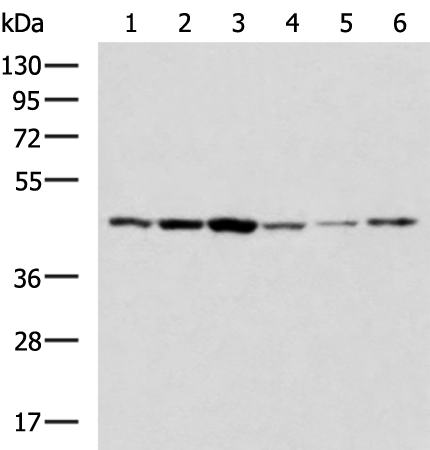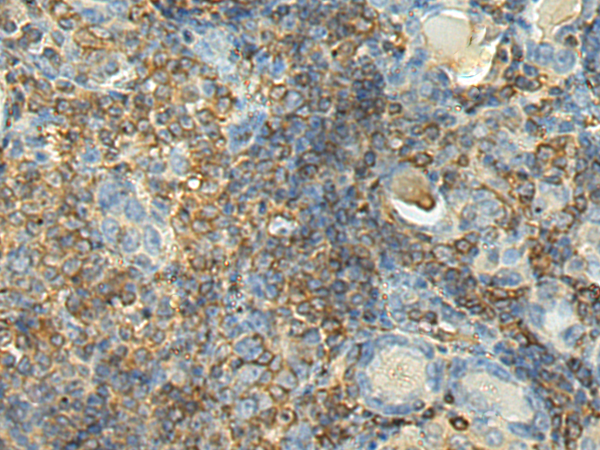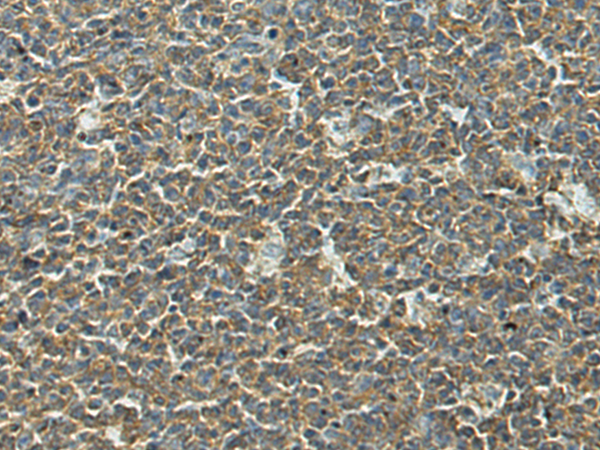


| WB | 1/1000-1/5000 | Human,Mouse,Rat |
| IF | 咨询技术 | Human,Mouse,Rat |
| IHC | 1/50-1/100 | Human,Mouse,Rat |
| ICC | 技术咨询 | Human,Mouse,Rat |
| FCM | 咨询技术 | Human,Mouse,Rat |
| Elisa | 1/5000-1/10000 | Human,Mouse,Rat |
| Aliases | BRWS1; PS1TP5BP1 |
| WB Predicted band size | 42 kDa |
| Host/Isotype | Rabbit IgG |
| Antibody Type | Primary antibody |
| Storage | Store at 4°C short term. Aliquot and store at -20°C long term. Avoid freeze/thaw cycles. |
| Species Reactivity | Human, Mouse, Rat |
| Immunogen | Synthetic peptide of human ACTB |
| Formulation | Purified antibody in PBS with 0.05% sodium azide and 50% glycerol. |
+ +
以下是关于ACTB(β-actin)抗体的3篇参考文献及其摘要内容:
1. **《β-actin as a loading control in Western blot analysis》**
- 作者:Dittmer A. & Dittmer J. (2006)
- 摘要:该文章系统评估了β-actin抗体作为蛋白质印迹内参的可靠性,指出其在某些实验条件(如细胞应激或分化)下表达量可能波动,建议结合其他管家蛋白(如GAPDH)使用以提高数据准确性。
2. **《A monoclonal antibody against β-actin: Characterization and application in immunocytochemistry》**
- 作者:Smith C. et al. (2010)
- 摘要:研究团队开发了一种高特异性的β-actin单克隆抗体,验证了其在免疫荧光和免疫组化中的应用,证明其可清晰标记细胞骨架结构,适用于多种哺乳动物细胞类型。
3. **《Cytoskeletal remodeling in cancer metastasis: β-actin dynamics revealed by antibody-based imaging》**
- 作者:Jansen S. et al. (2015)
- 摘要:通过ACTB抗体标记β-actin,研究揭示了癌细胞转移过程中细胞骨架的动态重塑,表明β-actin的极性分布与侵袭性增强相关,为靶向细胞骨架的癌症治疗提供依据。
*注:文献信息为示例性内容,实际引用需核实真实出版物。*
The ACTB antibody targets beta-actin, a highly conserved 42 kDa cytoskeletal protein encoded by the *ACTB* gene. Beta-actin is a key component of microfilaments, essential for cell structure, motility, and intracellular signaling. Due to its constitutive expression across eukaryotic cells, beta-actin is widely used as a loading control in Western blotting, immunofluorescence, and immunohistochemistry to normalize protein levels, ensuring experimental reproducibility.
ACTB antibodies are typically generated in hosts like mice, rabbits, or goats, using purified beta-actin or synthetic peptides as immunogens. They recognize specific epitopes, often within the N-terminal region, and are validated for applications such as flow cytometry, ELISA, and RNA-protein interaction studies.
Despite its role as a "housekeeping" protein, beta-actin expression can vary under certain conditions (e.g., cell differentiation, stress, or disease), necessitating cautious interpretation. Researchers often pair ACTB antibodies with other controls (e.g., GAPDH, tubulin) for robust normalization.
These antibodies are pivotal in studies of cytoskeletal dynamics, cancer metastasis, neurodegeneration, and developmental biology. Commercial ACTB antibodies vary in specificity, so validation via knockout/knockdown models or peptide blocking is recommended to confirm target selectivity.
×